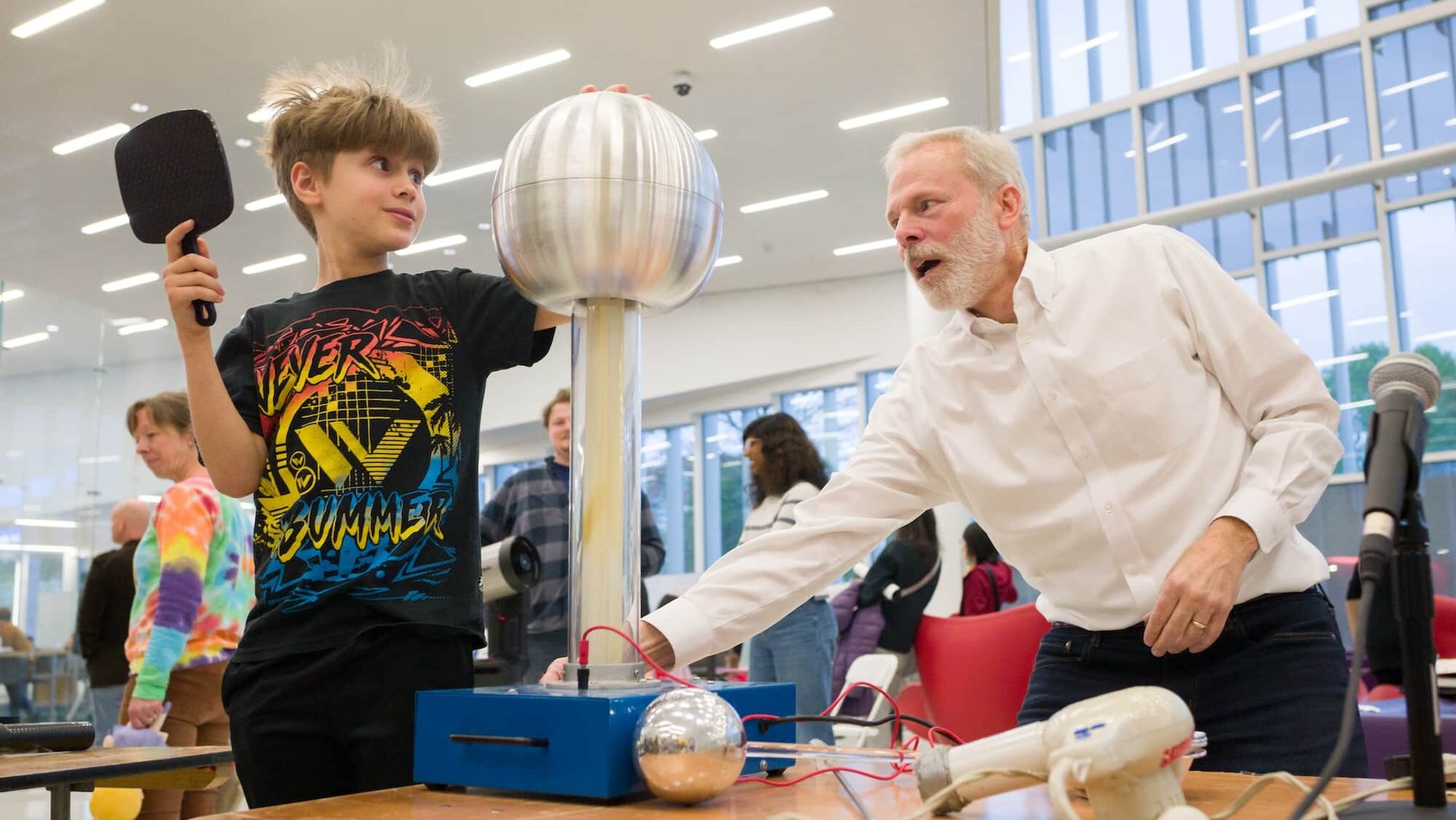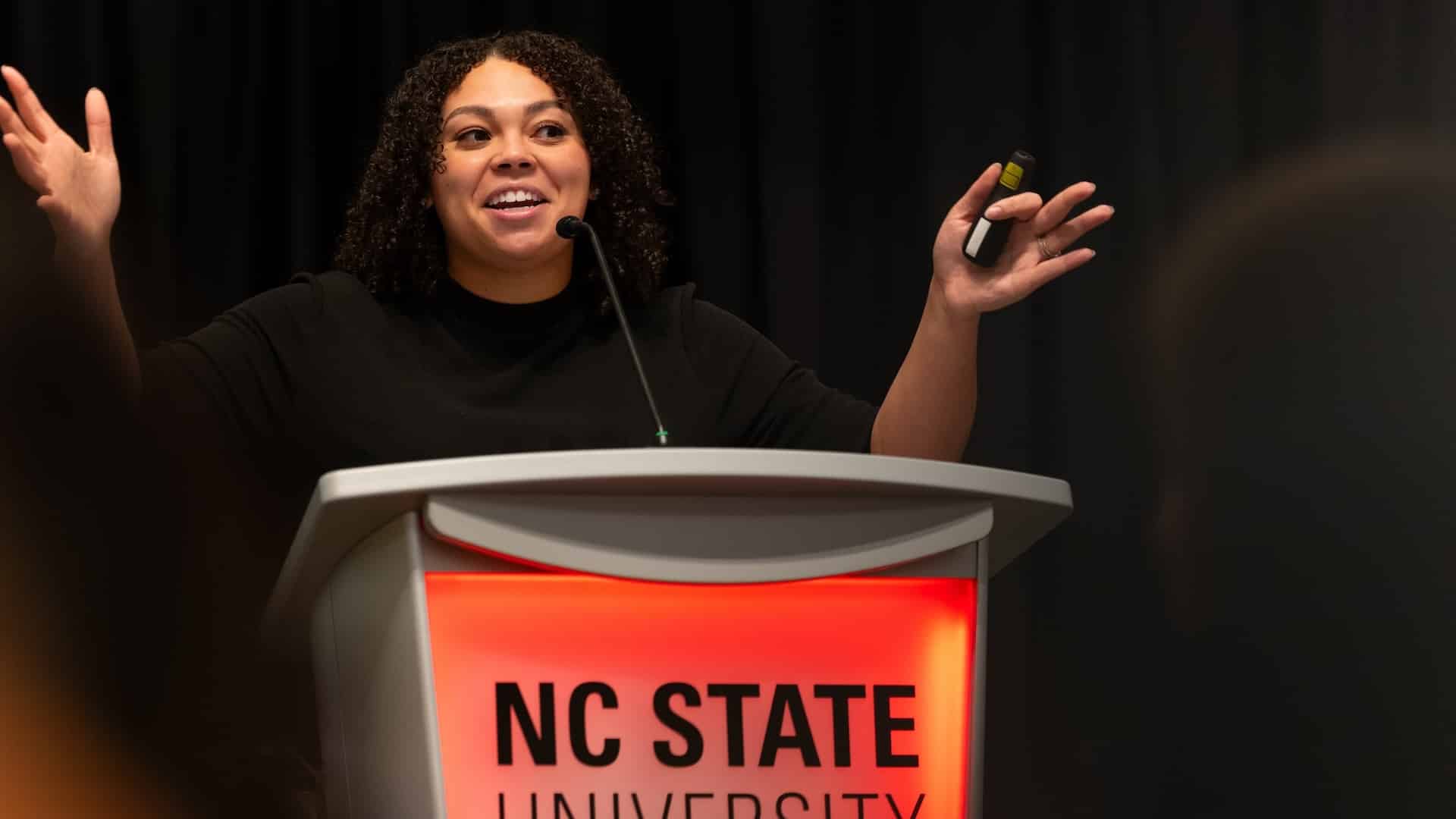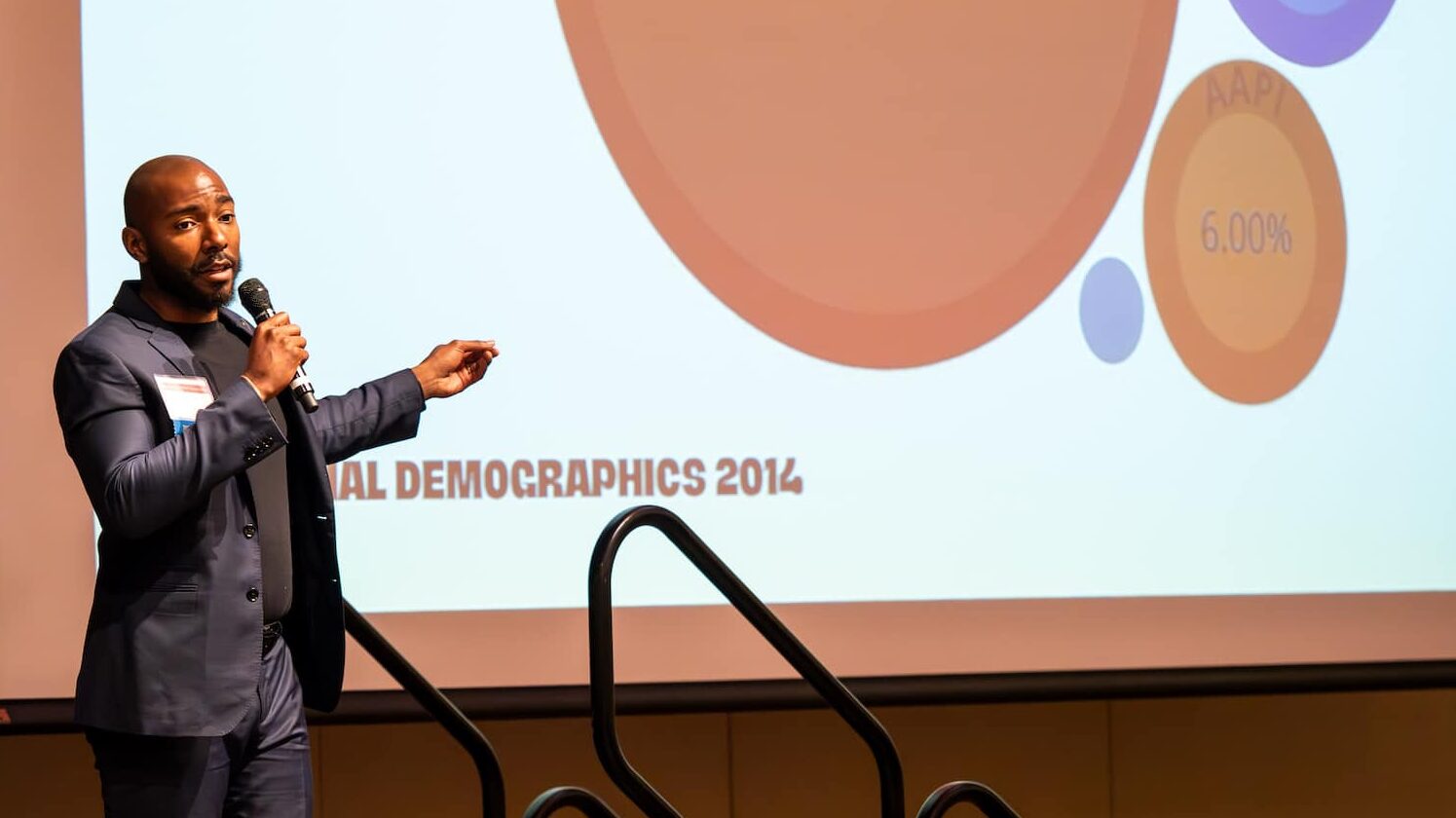An Organic Partnership
NC State's Organic and Carbon Electronics faculty cluster is providing hands-on research opportunities for Wake Technical Community College students.
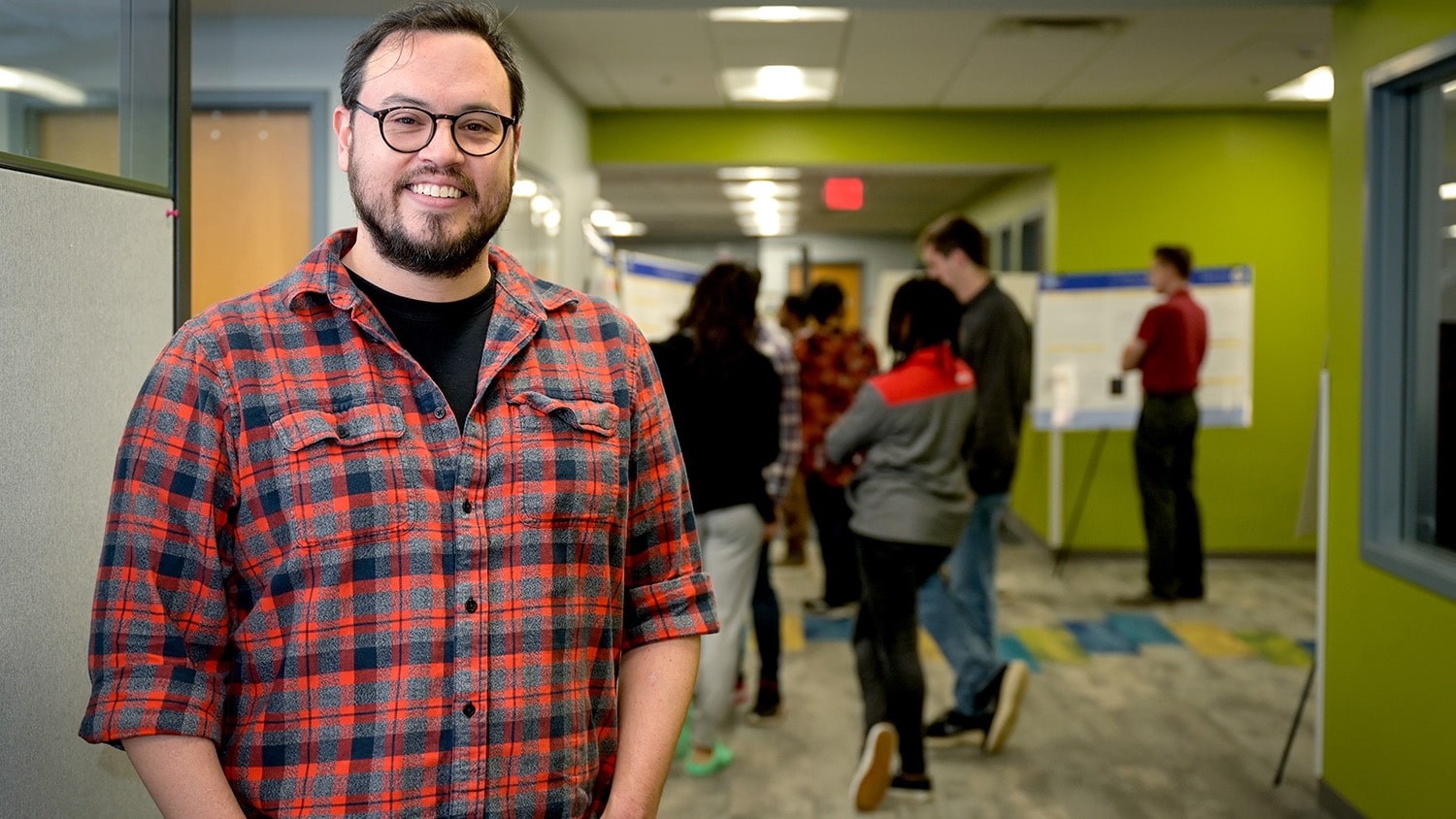
When Ben Hines left his undergraduate studies at NC State in 2009 to join the workforce, he never imagined he’d be back 15 years later getting a doctorate in physics.
While working at a construction job, his conversations with the company owner, a physicist, piqued his interest in the field and inspired him to give school another chance. In 2019, he enrolled part time at Wake Technical Community College and eventually transferred to NC State. Hines has since completed his bachelor’s in physics and is now studying organic photovoltaics in the Organic and Carbon Electronics Lab (ORaCEL) as part of his graduate work.
“I think community college transfers are a critical untapped resource for STEM.”
Returning to school hasn’t been easy, but the support he found at Wake Tech and NC State has made it possible. He’s looking to give back by mentoring community college students pursuing careers in science, technology, engineering and math (STEM). Hines has become a key part of a new partnership between ORaCEL and Wake Technical Community College’s STEM Academic Research and Training (START) program. START provides paid internship opportunities for Wake Tech students to work on research projects with faculty at four-year institutions.
Dan Dougherty, a physics professor and founding member of ORaCEL, developed the partnership program. ORaCEL — one of NC State’s 20 faculty clusters in the Chancellor’s Faculty Excellence Program — welcomed its first cohort of START students in spring 2023. The students work on research projects that contribute to ORaCEL’s overarching goal of revolutionizing the use and manufacturing of carbon, organic and hybrid-based technologies to build a future with more sustainable living and agriculture.
“I think community college transfers are a critical untapped resource for STEM,” Dougherty said. “Investing in community college students could set up North Carolina to be a key source of highly trained STEM graduates to work in the revamped electronic manufacturing industry.”
A Fresh Start and a Green Future
For Hines, mentoring START students holds a special meaning.
“Working with START has been really meaningful to me, because Wake Tech and the physics department here at NC State gave me the confidence to come back to school, get my degree and travel on this career path that I’ve started on,” he said.
After enrolling at NC State as a full-time undergraduate student at the age of 33, Hines faced the pressures of juggling academics and adult responsibilities.
“Being a returning student — and a returning transfer student, at that — is not easy,” Hines said. “Life doesn’t stop just because you’re in school.”
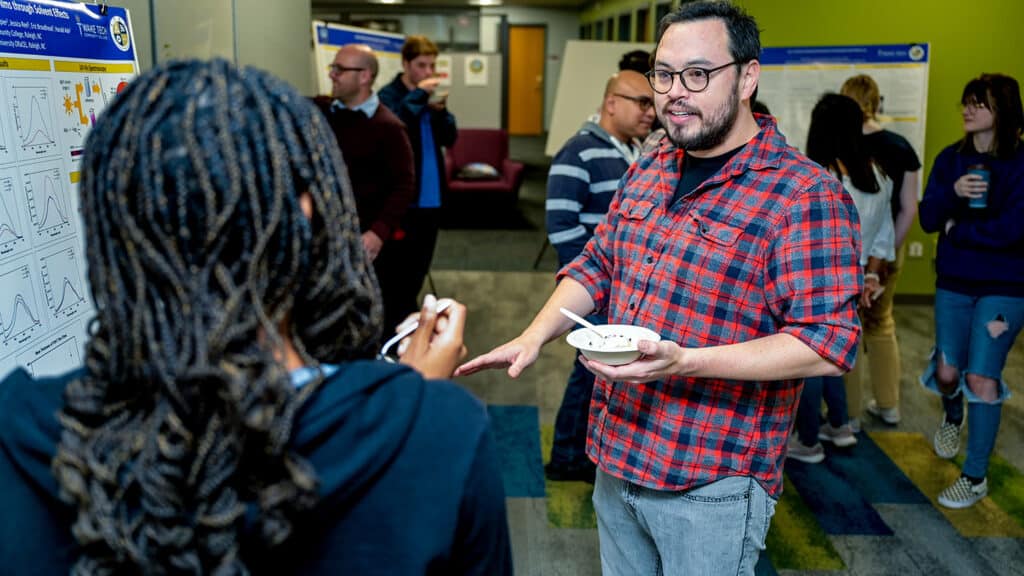
To make ends meet, Hines did paid undergraduate research at ORaCEL — funded by the Provost’s Professional Experience program — under co-director and Goodnight Innovation Distinguished Professor of Physics Harald Ade.
“I got to present my research at the McCormick Undergraduate Research Symposium,” Hines said. “That gave me a lot of experience on how to pace myself and how to present information, because the symposium was a wonderful experience on scientific communication.”
When Dougherty and Ade — who is now Hines’ doctoral advisor — presented him with the opportunity to help them with START, Hines knew he couldn’t pass it up.
“The opportunities that opened up to me after I got my bachelor’s at NC State were unreal.”
“I spent my entire adult life without a degree, so I had to take jobs that were not degree-based. The opportunities that opened up to me after I got my bachelor’s at NC State were unreal,” Hines said. “I felt motivated to work with the START program, so that I could give back and help inspire other students to take paths similar to mine.”
Dougherty takes on a more administrative role for ORaCEL’s partnership with START, making the initial outreach to Wake Tech and handling grant planning. But it’s Hines who has built the professional development aspect of the program. He helps build the START students’ week-to-week curriculum and design their research projects. During the one day a week they visit NC State’s campus over the course of the semester, he teaches them lab skills and how to analyze data.
Through their research projects at ORaCEL, START students don’t only learn transferable research and lab skills. They make an impact in their desired career fields, and contribute to the future of sustainable energy.
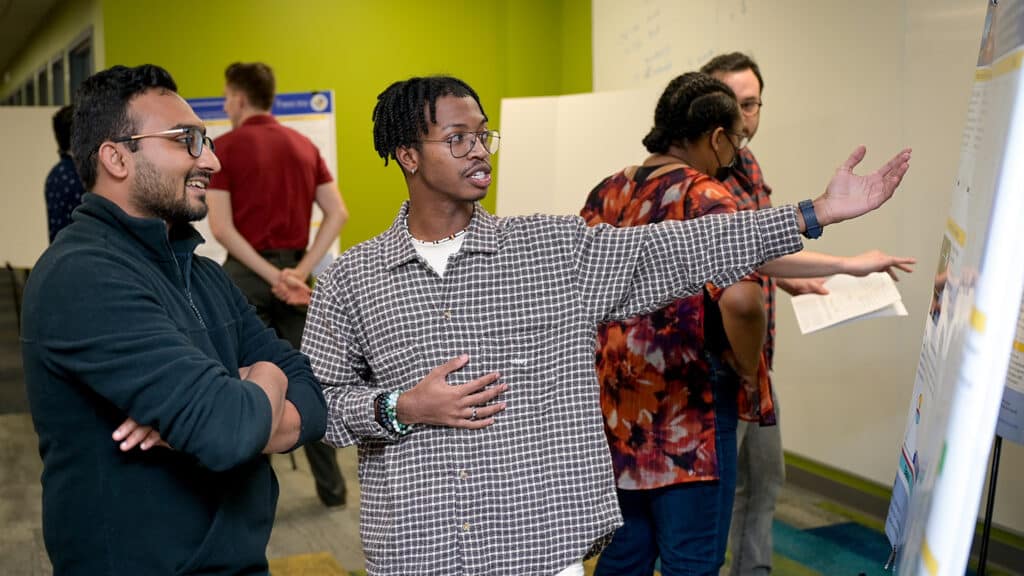
Wake Tech student Damien Johnson II worked on one of the projects Hines developed, which involved quantifying the effect of mechanical stretching on the light absorption properties of a polymer known as P3HT. Johnson learned about material processing — that is, how to make polymer films — and optical characterization through ultraviolet-visible absorption spectroscopy.
“My research shows that different techniques of spin coating — and different uses of solvents when spin coating — can change the absorptivity of the polymer,” he said. “All of these thin films are very important in how solar cells work, and how solar panels absorb sunlight and turn it into energy that we can use to power our homes. You do not want a solar panel that cannot absorb much. You want something that’s going to absorb a lot.”
“If we can understand how these materials work and their properties, we can then improve the technologies to generate green energy,” Hines added.
Johnson — a Community College Collaboration (C3) student with plans to major in aerospace engineering once he transfers to NC State — initially thought the START program would offer excellent lab training to set him up for a career as an astronaut.
“If you want to be an astronaut one day, having lab experience is really important,” he said. “I looked up, ‘What am I going to be doing while I’m in space?’ It’s going to be lab work and research.”
But Johnson has gained more from the experience than he ever imagined.
“I’ve learned characterization techniques like spin coating and profilometry. I know about Beer-Lambert law, and all these different niche things that I would never expect myself to know,” Johnson said. “The experience has changed my life and made me want to pursue research more. Before, I didn’t know if I wanted to get a Ph.D. one day, but now I do.”
”And I get to do the science I dreamed of doing as a kid,” he added. “I feel like Johnny Test or Dexter — working in a laboratory all the time, mixing different chemicals and solvents.”
Hines, knowing firsthand the value of hands-on STEM training, is proud to be part of a partnership that offers community college students the opportunity to gain experience in the fields they aspire to work in someday.
“Classwork helps us think about issues we care about and understand the jobs we want to do. Every university provides that,” Hines said. “But what makes NC State unique is that we help North Carolinians gain the confidence and the skills to do the jobs they want to do.”
Unlocking an Untapped Resource
Community college students like Johnson are already reaping the benefits of the START program, but Dougherty has a vision of the ORaCEL-START partnership being a pilot program for something bigger.
Dougherty believes that putting more resources into bridge programs for community college students will help NC State — and eventually, North Carolina as a whole — tap into a new talent pool that will help the state grow as a producer of STEM professionals. He’s exploring the possibility of leveraging and expanding on existing resources at NC State, including the C3 program, to start a bridge scholarship for community college students to complete STEM degrees at the university.
“At ORaCEL, we want to start a scholarship program for students in STEM fields related to our work. That’s where we would start, because that’s where we’re sure we can provide good mentoring,” Dougherty said. “ORaCEL is a very interdisciplinary laboratory, so we’d look for students interested in chemistry, physics and various engineering disciplines. It’s really clear to me that if we can get this going, it’s going to be a really important part of training for the future electronics industry in North Carolina.”
With the federal government passing the CHIPS and Science Act in 2022, Dougherty sees an opportunity for North Carolina’s economy to benefit from bringing back the electronic manufacturing industry to the U.S.
“The scale of needs of the CHIPS Act are such that we have to take strong action now to support it when electronic manufacturing is really becoming, or is in a position to be, a big part of our state economy,” Dougherty said. “I think this industry will be a huge part of the state economy in the next 20 years, and if it’s not, it’ll probably be because we failed to seize the day.”
Eventually, he’d like to see bridge scholarship and professional development programs for community college students established at the University of North Carolina System level.
“If you’re going to bring that whole industry back, you need a whole new population of highly trained scientists and engineers. Companies aren’t going to get by on hiring people who were going to graduate anyway,” said Dougherty. “I think it’s essential that we do something of that scale so that as the CHIPS Act starts to bear fruit, in the next 10-20 years, North Carolina will be ready to be a key source of highly trained STEM graduates to work in the revamped electronic manufacturing industry.”
$52.7 Billion
The CHIPS and Sciences Act provides funds to bolster research, manufacturing and workforce development related to semiconductors in the U.S.
75% of Global Production
East Asia produces the majority of the world’s semiconductors. The CHIPS Act seeks to bring the industry back to the U.S.
A Fundamental Technology
Semiconductors are found in everything from cell phones and household appliances to cars and defense systems.
Source: White House Fact Sheet
The mentorship and professional development aspect of these bridge programs will be key.
“It’s not enough to give students money to attend a four-year university,” said Dougherty. “You need to provide the resources and mentorship to help them stay in school.”
He’s moving toward this goal by applying for small-scale funding for scholarships to bring in more cohorts of students. Establishing a UNC System-wide bridge program for community college students is an ambitious goal, but START has proved an ideal starting point.
“The great thing about the START program is that it helps us establish a track record of mentoring community college students,” Dougherty said. “It also helps us see what the students need and what they value.”
- Categories:
